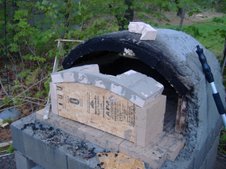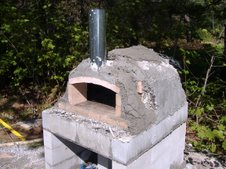 In previous discussions, we explored how to generate liquid fuel from nuclear power, or other conventional heat sources, in order to save humanity for a few more centuries, and buy shiny things for ourselves. Today, our fellow traveler Rivrdog brings up an excellent point, that electric cars will require the nation’s electrical generation and distribution systems to be made bigger.
In previous discussions, we explored how to generate liquid fuel from nuclear power, or other conventional heat sources, in order to save humanity for a few more centuries, and buy shiny things for ourselves. Today, our fellow traveler Rivrdog brings up an excellent point, that electric cars will require the nation’s electrical generation and distribution systems to be made bigger. So, tonight, instead of generating new liquid fuel, we will replace oil with nuclear power, and calculate how much bigger the electrical system will need to be to replace oil.
Entering Arguments:
5,000,000,000 barrels of oil used annually;
1,022,000 MW of current installed electrical generation capacity;
1 Bbl oil = 5,800,000 BTU;
and 1,000,000 BTU = .293 MW-hr; so
(5,000,000,000 Bbl/yr) * (5,800,000 BTU/Bbl) * (0.293 MW-hr/1,000,000 BTU) * (1 day/24hr) * (1 yr/365 day) = 980,000 MW, or roughly a doubling of the existing electrical generation capacity.
But the thermal losses are before the nameplate rating at the power plant. In the internal combustion engine, the losses are post oil (~80%). So the oil ‘work’ to be replaced seems to be (1/5) times 970,000 MW, or a national increase of ~20%.
20% seems low to me, but the calculator keeps coming up with the same thing.








1 comment:
I've heard that same figure several times. The problems (and expense) come because a 20% increase is beyond what the current system can handle with additional capacity improvements, so there would likely have to be almost a total rebuild.
The rebuild is overdue, it should have been done in the '70's, but it will be very expensive, and if it was properly costed out NOW, it is likely that the mania for battery-electric vehicles would die a quick death.
The problem is that the leaders are very adept at hiding this sort of cost to achieve an end, just as they hid the true costs (and inefficiencies) of Ethanol.
My prediction is that electric cars will get sold, but fortunately for us, they will not sell well due to inflated costs and poor performance/range. We will thus save ourselves and put off for another generation the needed overhaul of our grid infrastructure.
Post a Comment